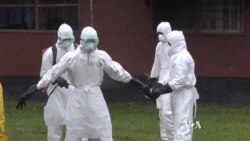Public health experts say Ebola victims are at their most contagious after death.
In Liberia, where Ebola has killed more than 1,500 people, authorities have worked hard to convince people to allow specialized burial teams to take away dead bodies. But these safety measures, while necessary, make it hard for people to say good bye to their loved ones.
It took a burial team hours to dig Jartu Kerkula's grave in the pounding rain. Later, under a drizzle, they entered the woman's home in Joe Blow Town to retrieve her body.
There is no time for rain. Sunlight can kill Ebola. The burial team likes sunny days because they are safer. But they must bury Jartu today. Neighbors standing around say they are getting anxious.
Jartu died the day before, alone, sitting in her living room. Health workers had removed her four kids the night before when they came by and found her convulsing.
The children were taken for observation to the Ebola holding center in Dolo Town, the same one that had sent Jartu home just days before she died. The treatment units in Monrovia were full. The ambulance wouldn’t take her there.
As the burial team brings Jartu out in a body bag, her niece, Jackie Smith, moves toward the house, her phone raised to try to take a picture.
The burial chief orders her back -- the disinfecting chemicals are too strong, he says.
“The family is not burying her, [we would] at least like to see her for the last time, so I feel so bad,” Smith said.
The family will never know if Jartu had Ebola. Liberia does not have resources to test all the living, much less the dead. Margibi County must treat every death as Ebola.
No one here today is resisting. The family wants precautions taken. But it’s hard.
Jartu was a church treasurer, a devout Christian. But there will be no all-night wake, no funeral, no “home-going” as her brother, Reverend John Singbae, called it.
“The [children] don’t know what is happening. So for them to really accept the reality that their mother is dead, they’re going to live with that nightmare," Singbae said.
"They can’t really visualize. They didn’t see their mother being buried. They last saw their mother when they were feeding her. They can’t really capture what happened. So they live in that gap,” he said.
Singbae and a few other family members stand in a field of high grass across from the cemetery entrance. They can’t go in with the burial team. It’s too dangerous.
The local mayor, Emmanuel Fatoma, watches as the team unloads the body. These precautions save lives but deepen the sorrow, he said.
“It is disgraceful to us because our culture of burying is when someone dies, you give them a lot of respect. But for now, it is not happening like that. You do it the way it is now, just fear, so that next person can’t die. It’s very embarrassing,” said Fatoma.
Fear of contagion has people keeping their distance, even in grief.
Jartu’s niece walks to the far edge of the field, her face scrunched with tears. Jartu’s brother remembers peering into the window of Jartu’s house the day before. Health workers told them not to go in.
“And I call her, call her. She didn’t answer so I assumed that she was dead,” Singbae said.
He rubbed his hand down his face as he pulled out a handkerchief. It takes what feels unnaturally long for someone to reach out and comfort him.
They talk of maybe moving Jartu one day, holding a proper burial later, when Ebola is gone, if the kids are ok.
The burial team then came out with their shovels, and the family left as the rain started to come down in diagonal sheets.





